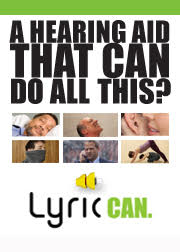Your heart and hearing may have more in common than you realize says the Better Hearing Institute (BHI),(www.BetterHearing.org) which is raising awareness of the link between hearing loss and cardiovascular disease for World Heart Day, September 29. A growing body of research shows that a person’s hearing health and cardiovascular health frequently correspond. So BHI is encouraging people to take a free, confidential, online hearing check at www.BetterHearing.org to help determine if they need a comprehensive hearing test by a hearing healthcare professional.
Studies show that a healthy cardiovascular system—a person’s heart, arteries, and veins—has a positive effect on hearing. Conversely, inadequate blood flow and trauma to the blood vessels of the inner ear can contribute to hearing loss.
David R. Friedland, MD, PhD, Professor and Vice-Chair of Otolaryngology and Communication Sciences at the Medical College of Wisconsin in Milwaukee, has been studying the relationship between cardiovascular and hearing health for years.
He says, “The inner ear is so sensitive to blood flow that it is possible that abnormalities in the cardiovascular system could be noted here earlier than in other less sensitive parts of the body.”
Dr. Friedland and fellow researchers found that audiogram pattern correlates strongly with cerebrovascular and peripheral arterial disease and may represent a screening test for those at risk. In their study, they concluded that patients with low-frequency hearing loss should be regarded as at risk for cardiovascular events, and appropriate referrals should be considered.
Five Heart-Healthy Reasons to Get a Hearing Test
1. Six decades of research points to heart-hearing health link.
A comparative review of more than 60 years of research found a correlation between cardiovascular and hearing health. Specifically, the study authors concluded that the negative influence of impaired cardiovascular health on both the peripheral and central auditory system—and the potential positive influence of improved cardiovascular health on these same systems—have been found through a sizable body of research. (http://ow.ly/BqqPy)
2. The ear may be a window to the heart.
Some experts find the evidence showing a link between cardiovascular and hearing health so compelling that they say the ear may be a window to the heart. They encourage collaboration between hearing care providers, cardiologists, and other healthcare professionals. Some even call on hearing care professionals to include cardiovascular health in patient case history and to measure their patients’ blood pressure. (http://ow.ly/Bp7oV; http://ow.ly/BqYsK; http://ow.ly/BqZdt)
3. The same lifestyle behaviors that affect the heart impact hearing.
More evidence of the interconnectedness between cardiovascular and hearing health is found in three studies on modifiable behaviors: One found that a higher level of physical activity is associated with lower risk of hearing loss in women. Another revealed that smokers and passive smokers are more likely to suffer hearing loss. And a third found that regular fish consumption and higher intake of long-chain omega-3 polyunsaturated fatty acids are associated with lower risk of hearing loss in women. Coincidence? Or does it all come back to blood flow to the inner ear? Research is ongoing. (http://ow.ly/BqrlJ; http://ow.ly/Bqsz0; http://ow.ly/BqtO3)
4. Addressing hearing loss improves quality of life, helps reduce stress.
Eight out of 10 hearing aid users say they’re satisfied with the changes that have occurred in their lives due to their hearing aids. Many say they see improvements in their life overall, in interpersonal relationships, and that they experience reduced anger and frustration, and enhanced emotional stability. (http://ow.ly/AZ2D7)
5. Today’s hearing aids are better than ever and virtually invisible.
State-of-the-art, sleek, sophisticated, and virtually invisible, today’s hearing aids combine high-performance technology and style with durability and ease-of-use. They’re a high-tech tool to help people stay socially, physically, and cognitively active. The options are so varied there’s an attractive solution for just about anyone.
For more information go to our website at www.elginaudiology.com and to take the BHI Hearing Check, visit www.BetterHearing.org.


